Wireless Health Monitoring with IOT: An Annotated Bibliography Report
VerifiedAdded on 2023/02/01
|14
|3326
|55
Report
AI Summary
This report presents an annotated bibliography on the application of the Internet of Things (IOT) in wireless health monitoring systems. The bibliography includes a selection of research papers and articles that explore various aspects of IOT in healthcare, such as mobile health systems, wearable devices, and data acquisition using sensors. The selected sources discuss the implementation of IOT in healthcare, including the use of Raspberry Pi for continuous health parameter monitoring, the application of MQTT protocol for data transmission, and the integration of big data analytics for analyzing health data. The bibliography highlights the importance of security in IOT devices and healthcare data, the role of cloud computing, and the potential of IOT to reduce healthcare costs and improve patient care. The annotated entries provide concise summaries of each source, outlining the key findings, methodologies, and contributions to the field. The report addresses the evolution of wireless technology, its impact on healthcare, and the challenges and opportunities associated with IOT-based health monitoring systems.
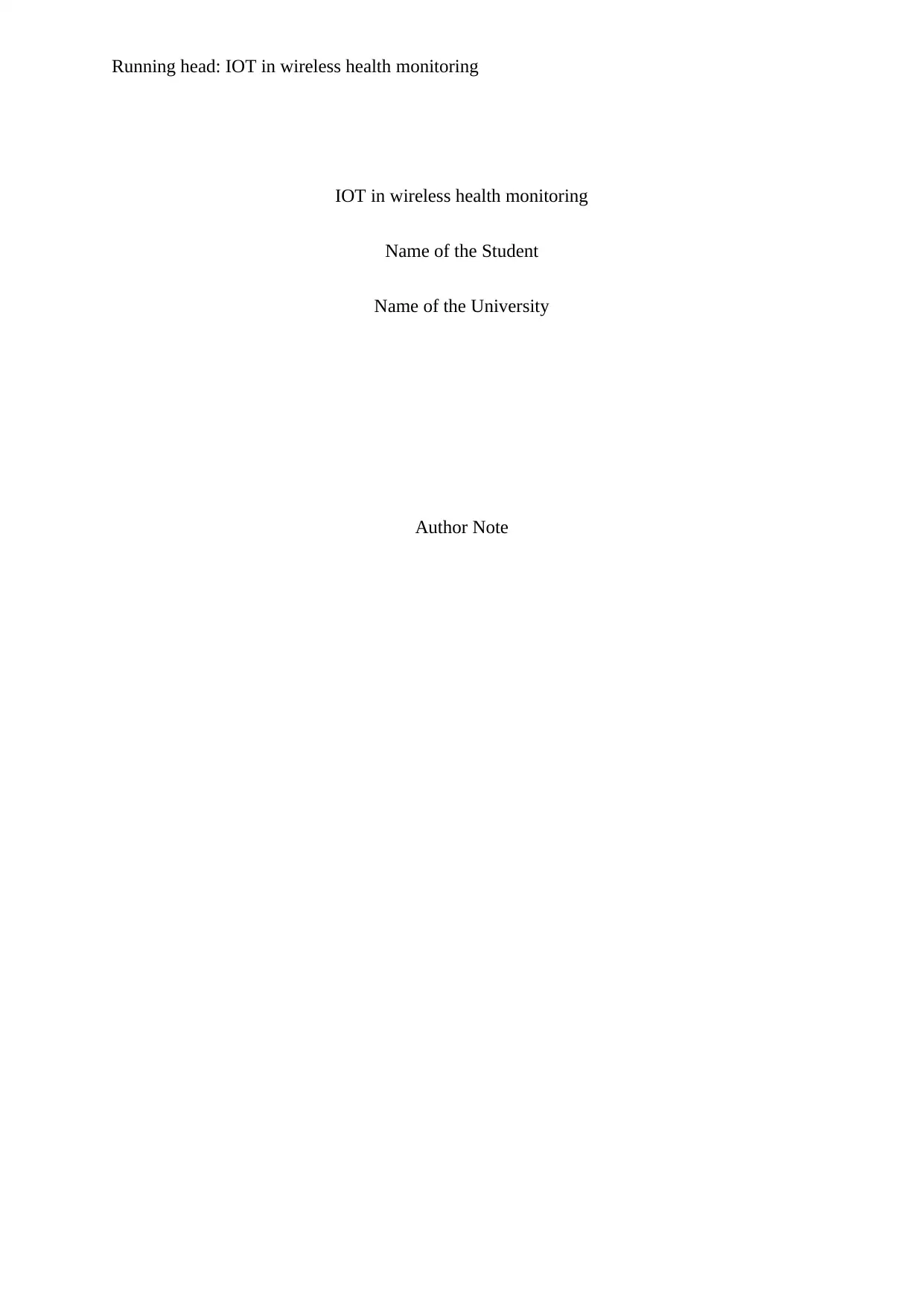
Running head: IOT in wireless health monitoring
IOT in wireless health monitoring
Name of the Student
Name of the University
Author Note
IOT in wireless health monitoring
Name of the Student
Name of the University
Author Note
Paraphrase This Document
Need a fresh take? Get an instant paraphrase of this document with our AI Paraphraser
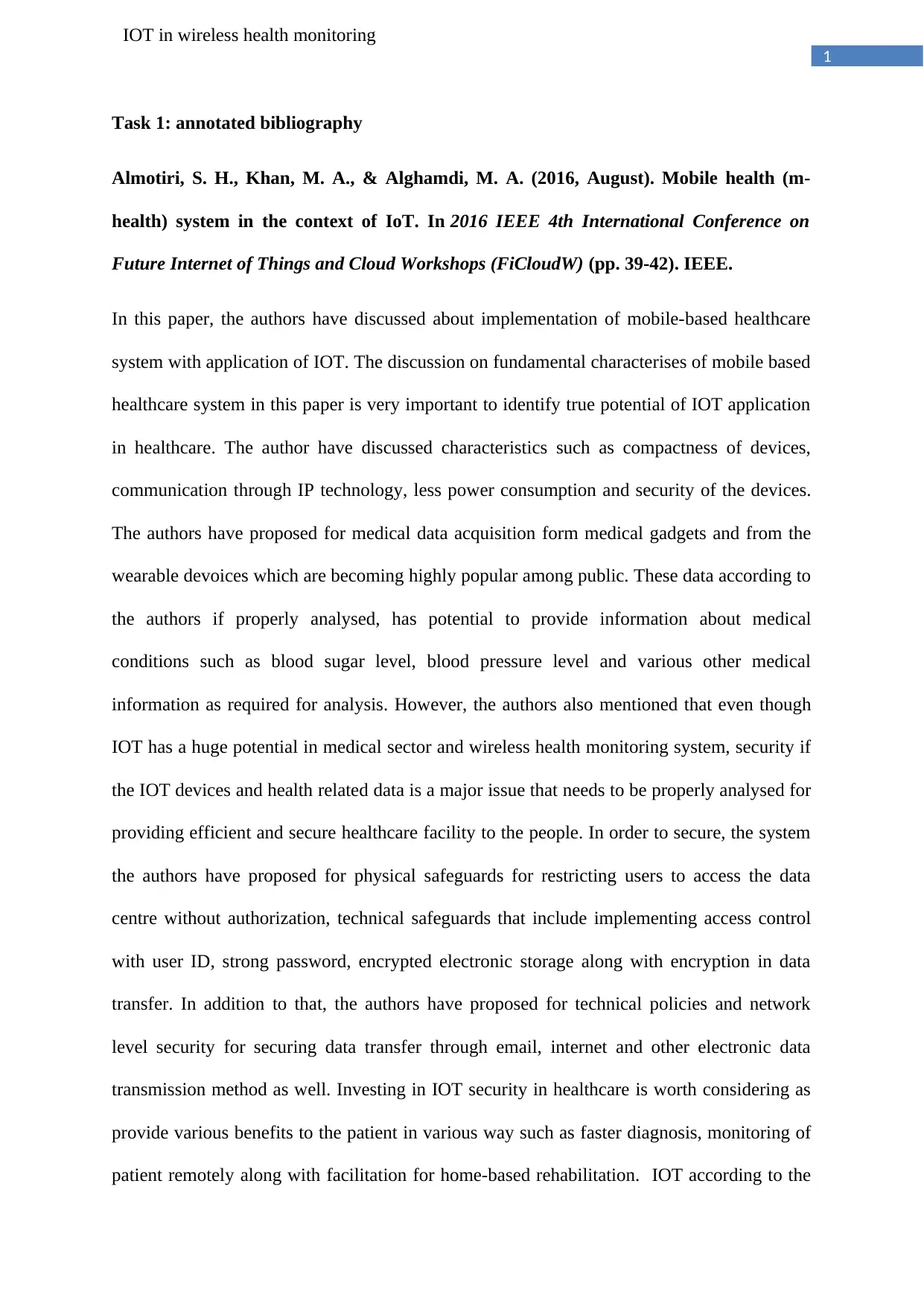
1
IOT in wireless health monitoring
Task 1: annotated bibliography
Almotiri, S. H., Khan, M. A., & Alghamdi, M. A. (2016, August). Mobile health (m-
health) system in the context of IoT. In 2016 IEEE 4th International Conference on
Future Internet of Things and Cloud Workshops (FiCloudW) (pp. 39-42). IEEE.
In this paper, the authors have discussed about implementation of mobile-based healthcare
system with application of IOT. The discussion on fundamental characterises of mobile based
healthcare system in this paper is very important to identify true potential of IOT application
in healthcare. The author have discussed characteristics such as compactness of devices,
communication through IP technology, less power consumption and security of the devices.
The authors have proposed for medical data acquisition form medical gadgets and from the
wearable devoices which are becoming highly popular among public. These data according to
the authors if properly analysed, has potential to provide information about medical
conditions such as blood sugar level, blood pressure level and various other medical
information as required for analysis. However, the authors also mentioned that even though
IOT has a huge potential in medical sector and wireless health monitoring system, security if
the IOT devices and health related data is a major issue that needs to be properly analysed for
providing efficient and secure healthcare facility to the people. In order to secure, the system
the authors have proposed for physical safeguards for restricting users to access the data
centre without authorization, technical safeguards that include implementing access control
with user ID, strong password, encrypted electronic storage along with encryption in data
transfer. In addition to that, the authors have proposed for technical policies and network
level security for securing data transfer through email, internet and other electronic data
transmission method as well. Investing in IOT security in healthcare is worth considering as
provide various benefits to the patient in various way such as faster diagnosis, monitoring of
patient remotely along with facilitation for home-based rehabilitation. IOT according to the
IOT in wireless health monitoring
Task 1: annotated bibliography
Almotiri, S. H., Khan, M. A., & Alghamdi, M. A. (2016, August). Mobile health (m-
health) system in the context of IoT. In 2016 IEEE 4th International Conference on
Future Internet of Things and Cloud Workshops (FiCloudW) (pp. 39-42). IEEE.
In this paper, the authors have discussed about implementation of mobile-based healthcare
system with application of IOT. The discussion on fundamental characterises of mobile based
healthcare system in this paper is very important to identify true potential of IOT application
in healthcare. The author have discussed characteristics such as compactness of devices,
communication through IP technology, less power consumption and security of the devices.
The authors have proposed for medical data acquisition form medical gadgets and from the
wearable devoices which are becoming highly popular among public. These data according to
the authors if properly analysed, has potential to provide information about medical
conditions such as blood sugar level, blood pressure level and various other medical
information as required for analysis. However, the authors also mentioned that even though
IOT has a huge potential in medical sector and wireless health monitoring system, security if
the IOT devices and health related data is a major issue that needs to be properly analysed for
providing efficient and secure healthcare facility to the people. In order to secure, the system
the authors have proposed for physical safeguards for restricting users to access the data
centre without authorization, technical safeguards that include implementing access control
with user ID, strong password, encrypted electronic storage along with encryption in data
transfer. In addition to that, the authors have proposed for technical policies and network
level security for securing data transfer through email, internet and other electronic data
transmission method as well. Investing in IOT security in healthcare is worth considering as
provide various benefits to the patient in various way such as faster diagnosis, monitoring of
patient remotely along with facilitation for home-based rehabilitation. IOT according to the
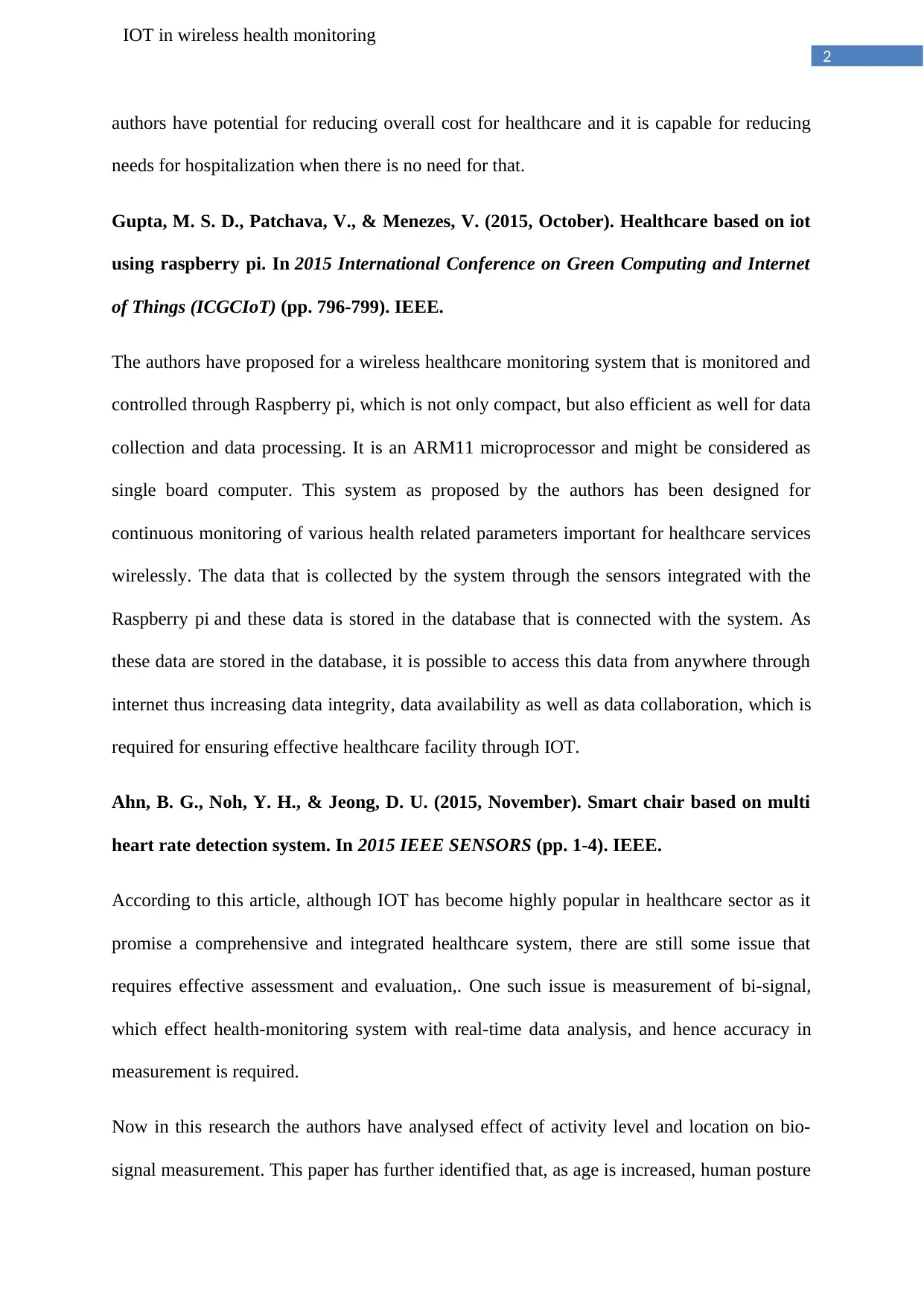
2
IOT in wireless health monitoring
authors have potential for reducing overall cost for healthcare and it is capable for reducing
needs for hospitalization when there is no need for that.
Gupta, M. S. D., Patchava, V., & Menezes, V. (2015, October). Healthcare based on iot
using raspberry pi. In 2015 International Conference on Green Computing and Internet
of Things (ICGCIoT) (pp. 796-799). IEEE.
The authors have proposed for a wireless healthcare monitoring system that is monitored and
controlled through Raspberry pi, which is not only compact, but also efficient as well for data
collection and data processing. It is an ARM11 microprocessor and might be considered as
single board computer. This system as proposed by the authors has been designed for
continuous monitoring of various health related parameters important for healthcare services
wirelessly. The data that is collected by the system through the sensors integrated with the
Raspberry pi and these data is stored in the database that is connected with the system. As
these data are stored in the database, it is possible to access this data from anywhere through
internet thus increasing data integrity, data availability as well as data collaboration, which is
required for ensuring effective healthcare facility through IOT.
Ahn, B. G., Noh, Y. H., & Jeong, D. U. (2015, November). Smart chair based on multi
heart rate detection system. In 2015 IEEE SENSORS (pp. 1-4). IEEE.
According to this article, although IOT has become highly popular in healthcare sector as it
promise a comprehensive and integrated healthcare system, there are still some issue that
requires effective assessment and evaluation,. One such issue is measurement of bi-signal,
which effect health-monitoring system with real-time data analysis, and hence accuracy in
measurement is required.
Now in this research the authors have analysed effect of activity level and location on bio-
signal measurement. This paper has further identified that, as age is increased, human posture
IOT in wireless health monitoring
authors have potential for reducing overall cost for healthcare and it is capable for reducing
needs for hospitalization when there is no need for that.
Gupta, M. S. D., Patchava, V., & Menezes, V. (2015, October). Healthcare based on iot
using raspberry pi. In 2015 International Conference on Green Computing and Internet
of Things (ICGCIoT) (pp. 796-799). IEEE.
The authors have proposed for a wireless healthcare monitoring system that is monitored and
controlled through Raspberry pi, which is not only compact, but also efficient as well for data
collection and data processing. It is an ARM11 microprocessor and might be considered as
single board computer. This system as proposed by the authors has been designed for
continuous monitoring of various health related parameters important for healthcare services
wirelessly. The data that is collected by the system through the sensors integrated with the
Raspberry pi and these data is stored in the database that is connected with the system. As
these data are stored in the database, it is possible to access this data from anywhere through
internet thus increasing data integrity, data availability as well as data collaboration, which is
required for ensuring effective healthcare facility through IOT.
Ahn, B. G., Noh, Y. H., & Jeong, D. U. (2015, November). Smart chair based on multi
heart rate detection system. In 2015 IEEE SENSORS (pp. 1-4). IEEE.
According to this article, although IOT has become highly popular in healthcare sector as it
promise a comprehensive and integrated healthcare system, there are still some issue that
requires effective assessment and evaluation,. One such issue is measurement of bi-signal,
which effect health-monitoring system with real-time data analysis, and hence accuracy in
measurement is required.
Now in this research the authors have analysed effect of activity level and location on bio-
signal measurement. This paper has further identified that, as age is increased, human posture
⊘ This is a preview!⊘
Do you want full access?
Subscribe today to unlock all pages.

Trusted by 1+ million students worldwide
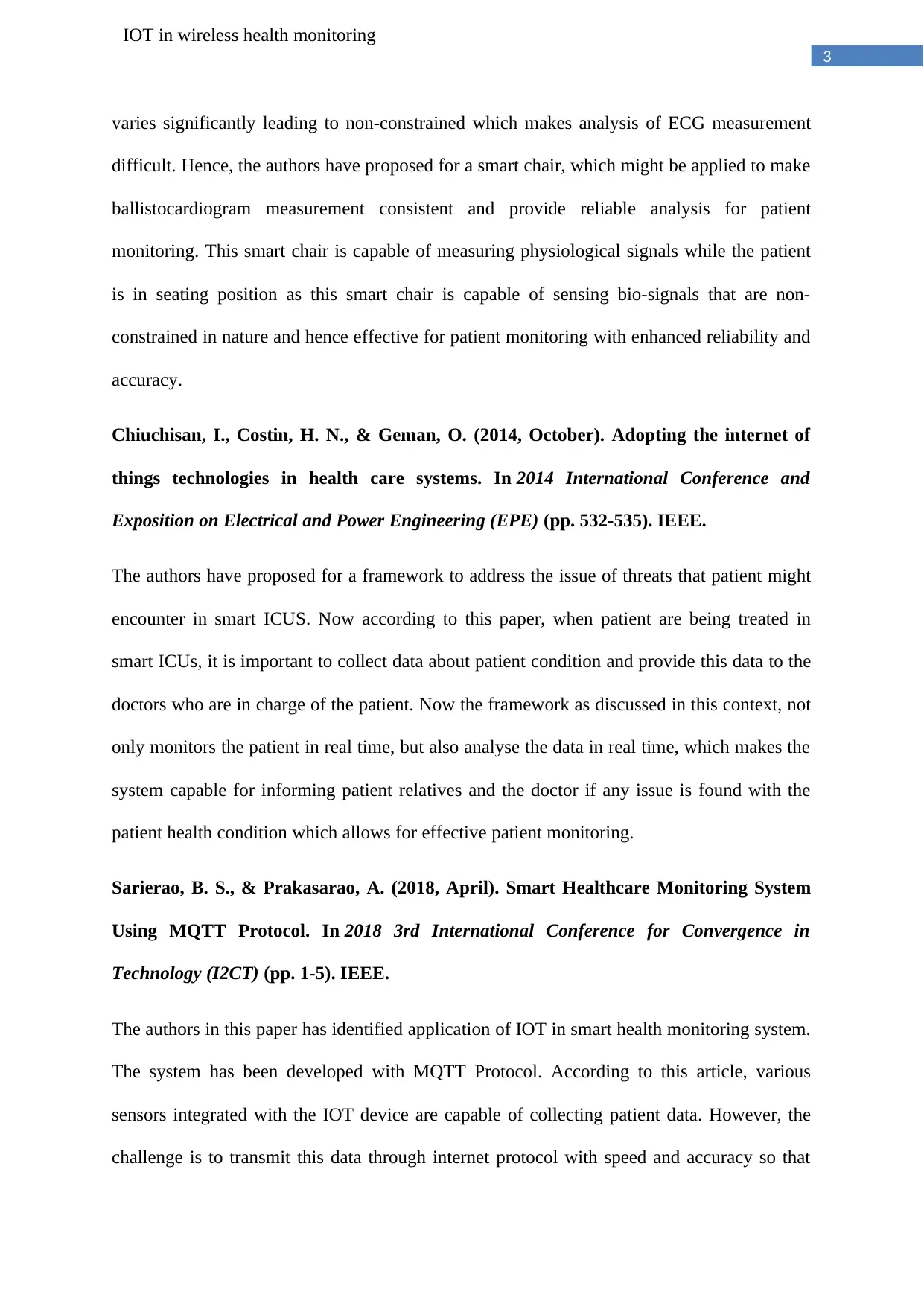
3
IOT in wireless health monitoring
varies significantly leading to non-constrained which makes analysis of ECG measurement
difficult. Hence, the authors have proposed for a smart chair, which might be applied to make
ballistocardiogram measurement consistent and provide reliable analysis for patient
monitoring. This smart chair is capable of measuring physiological signals while the patient
is in seating position as this smart chair is capable of sensing bio-signals that are non-
constrained in nature and hence effective for patient monitoring with enhanced reliability and
accuracy.
Chiuchisan, I., Costin, H. N., & Geman, O. (2014, October). Adopting the internet of
things technologies in health care systems. In 2014 International Conference and
Exposition on Electrical and Power Engineering (EPE) (pp. 532-535). IEEE.
The authors have proposed for a framework to address the issue of threats that patient might
encounter in smart ICUS. Now according to this paper, when patient are being treated in
smart ICUs, it is important to collect data about patient condition and provide this data to the
doctors who are in charge of the patient. Now the framework as discussed in this context, not
only monitors the patient in real time, but also analyse the data in real time, which makes the
system capable for informing patient relatives and the doctor if any issue is found with the
patient health condition which allows for effective patient monitoring.
Sarierao, B. S., & Prakasarao, A. (2018, April). Smart Healthcare Monitoring System
Using MQTT Protocol. In 2018 3rd International Conference for Convergence in
Technology (I2CT) (pp. 1-5). IEEE.
The authors in this paper has identified application of IOT in smart health monitoring system.
The system has been developed with MQTT Protocol. According to this article, various
sensors integrated with the IOT device are capable of collecting patient data. However, the
challenge is to transmit this data through internet protocol with speed and accuracy so that
IOT in wireless health monitoring
varies significantly leading to non-constrained which makes analysis of ECG measurement
difficult. Hence, the authors have proposed for a smart chair, which might be applied to make
ballistocardiogram measurement consistent and provide reliable analysis for patient
monitoring. This smart chair is capable of measuring physiological signals while the patient
is in seating position as this smart chair is capable of sensing bio-signals that are non-
constrained in nature and hence effective for patient monitoring with enhanced reliability and
accuracy.
Chiuchisan, I., Costin, H. N., & Geman, O. (2014, October). Adopting the internet of
things technologies in health care systems. In 2014 International Conference and
Exposition on Electrical and Power Engineering (EPE) (pp. 532-535). IEEE.
The authors have proposed for a framework to address the issue of threats that patient might
encounter in smart ICUS. Now according to this paper, when patient are being treated in
smart ICUs, it is important to collect data about patient condition and provide this data to the
doctors who are in charge of the patient. Now the framework as discussed in this context, not
only monitors the patient in real time, but also analyse the data in real time, which makes the
system capable for informing patient relatives and the doctor if any issue is found with the
patient health condition which allows for effective patient monitoring.
Sarierao, B. S., & Prakasarao, A. (2018, April). Smart Healthcare Monitoring System
Using MQTT Protocol. In 2018 3rd International Conference for Convergence in
Technology (I2CT) (pp. 1-5). IEEE.
The authors in this paper has identified application of IOT in smart health monitoring system.
The system has been developed with MQTT Protocol. According to this article, various
sensors integrated with the IOT device are capable of collecting patient data. However, the
challenge is to transmit this data through internet protocol with speed and accuracy so that
Paraphrase This Document
Need a fresh take? Get an instant paraphrase of this document with our AI Paraphraser
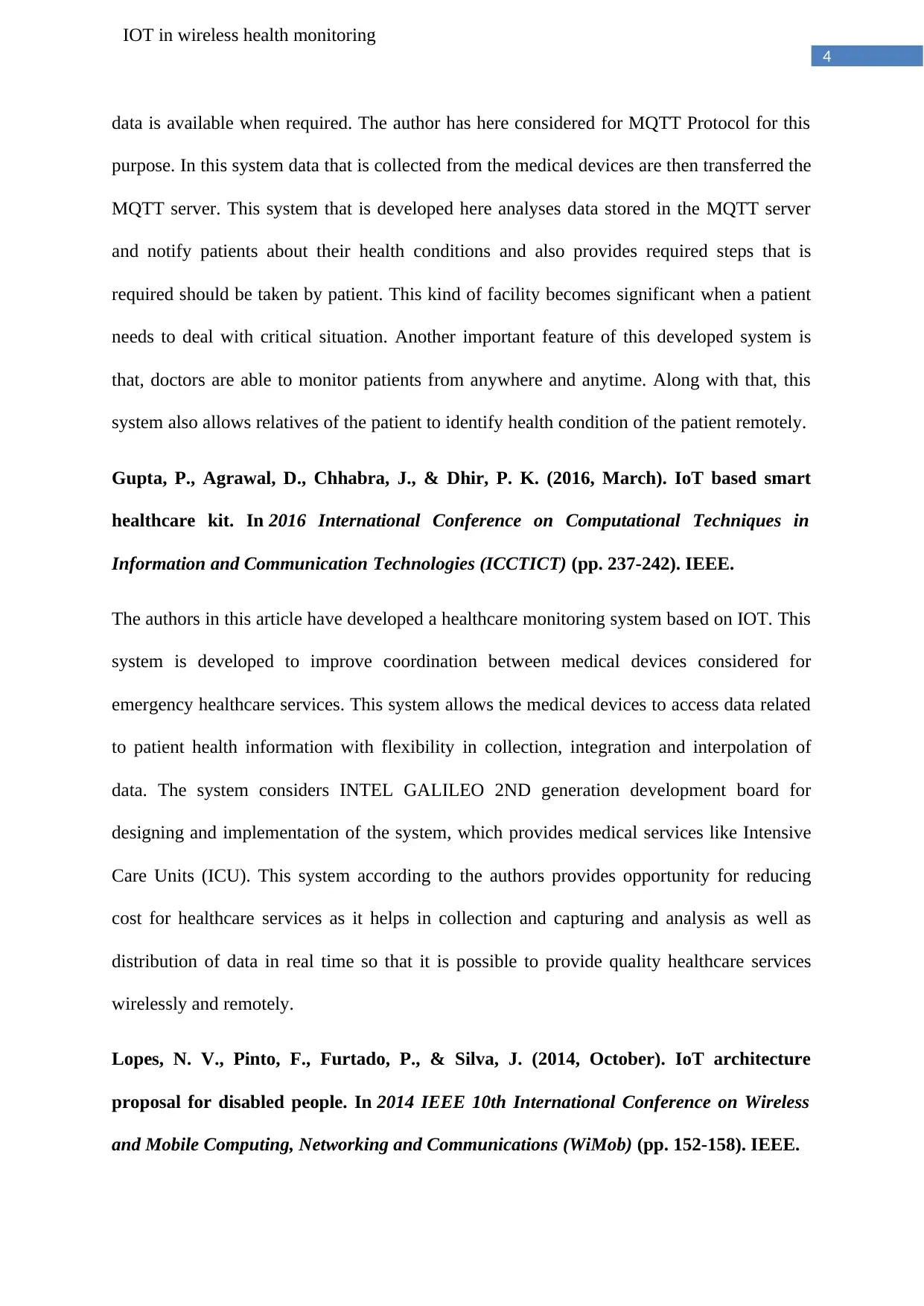
4
IOT in wireless health monitoring
data is available when required. The author has here considered for MQTT Protocol for this
purpose. In this system data that is collected from the medical devices are then transferred the
MQTT server. This system that is developed here analyses data stored in the MQTT server
and notify patients about their health conditions and also provides required steps that is
required should be taken by patient. This kind of facility becomes significant when a patient
needs to deal with critical situation. Another important feature of this developed system is
that, doctors are able to monitor patients from anywhere and anytime. Along with that, this
system also allows relatives of the patient to identify health condition of the patient remotely.
Gupta, P., Agrawal, D., Chhabra, J., & Dhir, P. K. (2016, March). IoT based smart
healthcare kit. In 2016 International Conference on Computational Techniques in
Information and Communication Technologies (ICCTICT) (pp. 237-242). IEEE.
The authors in this article have developed a healthcare monitoring system based on IOT. This
system is developed to improve coordination between medical devices considered for
emergency healthcare services. This system allows the medical devices to access data related
to patient health information with flexibility in collection, integration and interpolation of
data. The system considers INTEL GALILEO 2ND generation development board for
designing and implementation of the system, which provides medical services like Intensive
Care Units (ICU). This system according to the authors provides opportunity for reducing
cost for healthcare services as it helps in collection and capturing and analysis as well as
distribution of data in real time so that it is possible to provide quality healthcare services
wirelessly and remotely.
Lopes, N. V., Pinto, F., Furtado, P., & Silva, J. (2014, October). IoT architecture
proposal for disabled people. In 2014 IEEE 10th International Conference on Wireless
and Mobile Computing, Networking and Communications (WiMob) (pp. 152-158). IEEE.
IOT in wireless health monitoring
data is available when required. The author has here considered for MQTT Protocol for this
purpose. In this system data that is collected from the medical devices are then transferred the
MQTT server. This system that is developed here analyses data stored in the MQTT server
and notify patients about their health conditions and also provides required steps that is
required should be taken by patient. This kind of facility becomes significant when a patient
needs to deal with critical situation. Another important feature of this developed system is
that, doctors are able to monitor patients from anywhere and anytime. Along with that, this
system also allows relatives of the patient to identify health condition of the patient remotely.
Gupta, P., Agrawal, D., Chhabra, J., & Dhir, P. K. (2016, March). IoT based smart
healthcare kit. In 2016 International Conference on Computational Techniques in
Information and Communication Technologies (ICCTICT) (pp. 237-242). IEEE.
The authors in this article have developed a healthcare monitoring system based on IOT. This
system is developed to improve coordination between medical devices considered for
emergency healthcare services. This system allows the medical devices to access data related
to patient health information with flexibility in collection, integration and interpolation of
data. The system considers INTEL GALILEO 2ND generation development board for
designing and implementation of the system, which provides medical services like Intensive
Care Units (ICU). This system according to the authors provides opportunity for reducing
cost for healthcare services as it helps in collection and capturing and analysis as well as
distribution of data in real time so that it is possible to provide quality healthcare services
wirelessly and remotely.
Lopes, N. V., Pinto, F., Furtado, P., & Silva, J. (2014, October). IoT architecture
proposal for disabled people. In 2014 IEEE 10th International Conference on Wireless
and Mobile Computing, Networking and Communications (WiMob) (pp. 152-158). IEEE.
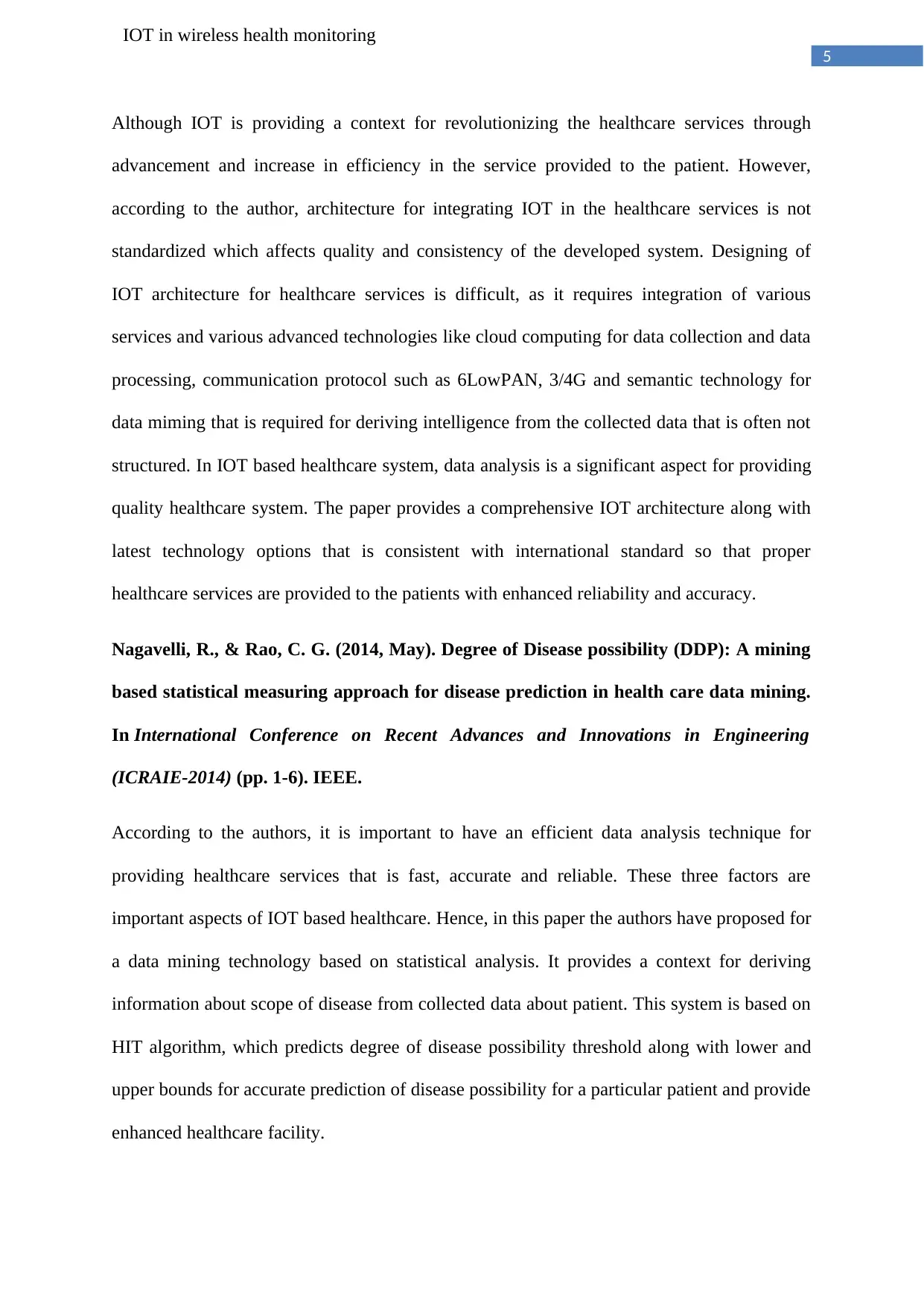
5
IOT in wireless health monitoring
Although IOT is providing a context for revolutionizing the healthcare services through
advancement and increase in efficiency in the service provided to the patient. However,
according to the author, architecture for integrating IOT in the healthcare services is not
standardized which affects quality and consistency of the developed system. Designing of
IOT architecture for healthcare services is difficult, as it requires integration of various
services and various advanced technologies like cloud computing for data collection and data
processing, communication protocol such as 6LowPAN, 3/4G and semantic technology for
data miming that is required for deriving intelligence from the collected data that is often not
structured. In IOT based healthcare system, data analysis is a significant aspect for providing
quality healthcare system. The paper provides a comprehensive IOT architecture along with
latest technology options that is consistent with international standard so that proper
healthcare services are provided to the patients with enhanced reliability and accuracy.
Nagavelli, R., & Rao, C. G. (2014, May). Degree of Disease possibility (DDP): A mining
based statistical measuring approach for disease prediction in health care data mining.
In International Conference on Recent Advances and Innovations in Engineering
(ICRAIE-2014) (pp. 1-6). IEEE.
According to the authors, it is important to have an efficient data analysis technique for
providing healthcare services that is fast, accurate and reliable. These three factors are
important aspects of IOT based healthcare. Hence, in this paper the authors have proposed for
a data mining technology based on statistical analysis. It provides a context for deriving
information about scope of disease from collected data about patient. This system is based on
HIT algorithm, which predicts degree of disease possibility threshold along with lower and
upper bounds for accurate prediction of disease possibility for a particular patient and provide
enhanced healthcare facility.
IOT in wireless health monitoring
Although IOT is providing a context for revolutionizing the healthcare services through
advancement and increase in efficiency in the service provided to the patient. However,
according to the author, architecture for integrating IOT in the healthcare services is not
standardized which affects quality and consistency of the developed system. Designing of
IOT architecture for healthcare services is difficult, as it requires integration of various
services and various advanced technologies like cloud computing for data collection and data
processing, communication protocol such as 6LowPAN, 3/4G and semantic technology for
data miming that is required for deriving intelligence from the collected data that is often not
structured. In IOT based healthcare system, data analysis is a significant aspect for providing
quality healthcare system. The paper provides a comprehensive IOT architecture along with
latest technology options that is consistent with international standard so that proper
healthcare services are provided to the patients with enhanced reliability and accuracy.
Nagavelli, R., & Rao, C. G. (2014, May). Degree of Disease possibility (DDP): A mining
based statistical measuring approach for disease prediction in health care data mining.
In International Conference on Recent Advances and Innovations in Engineering
(ICRAIE-2014) (pp. 1-6). IEEE.
According to the authors, it is important to have an efficient data analysis technique for
providing healthcare services that is fast, accurate and reliable. These three factors are
important aspects of IOT based healthcare. Hence, in this paper the authors have proposed for
a data mining technology based on statistical analysis. It provides a context for deriving
information about scope of disease from collected data about patient. This system is based on
HIT algorithm, which predicts degree of disease possibility threshold along with lower and
upper bounds for accurate prediction of disease possibility for a particular patient and provide
enhanced healthcare facility.
⊘ This is a preview!⊘
Do you want full access?
Subscribe today to unlock all pages.

Trusted by 1+ million students worldwide
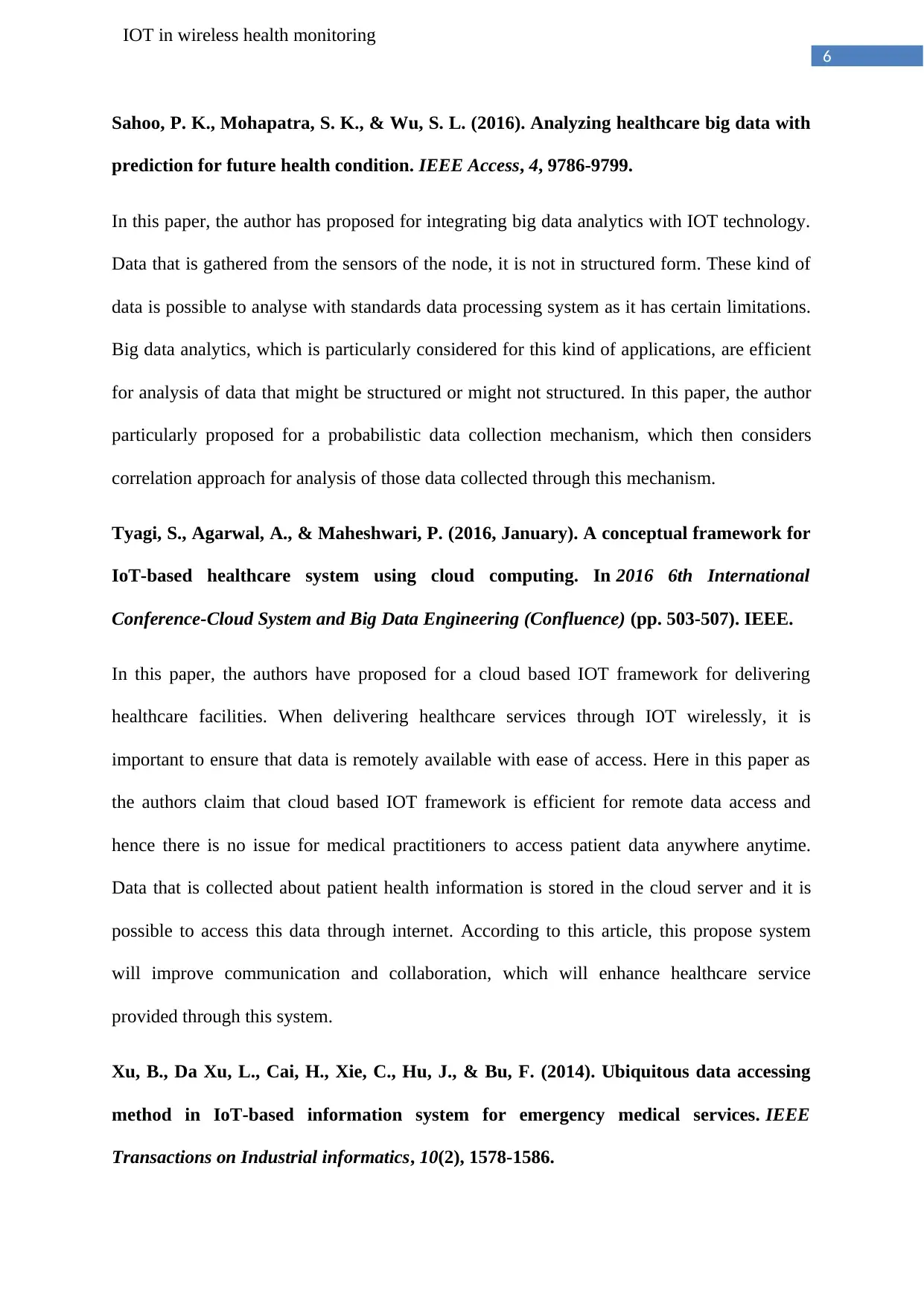
6
IOT in wireless health monitoring
Sahoo, P. K., Mohapatra, S. K., & Wu, S. L. (2016). Analyzing healthcare big data with
prediction for future health condition. IEEE Access, 4, 9786-9799.
In this paper, the author has proposed for integrating big data analytics with IOT technology.
Data that is gathered from the sensors of the node, it is not in structured form. These kind of
data is possible to analyse with standards data processing system as it has certain limitations.
Big data analytics, which is particularly considered for this kind of applications, are efficient
for analysis of data that might be structured or might not structured. In this paper, the author
particularly proposed for a probabilistic data collection mechanism, which then considers
correlation approach for analysis of those data collected through this mechanism.
Tyagi, S., Agarwal, A., & Maheshwari, P. (2016, January). A conceptual framework for
IoT-based healthcare system using cloud computing. In 2016 6th International
Conference-Cloud System and Big Data Engineering (Confluence) (pp. 503-507). IEEE.
In this paper, the authors have proposed for a cloud based IOT framework for delivering
healthcare facilities. When delivering healthcare services through IOT wirelessly, it is
important to ensure that data is remotely available with ease of access. Here in this paper as
the authors claim that cloud based IOT framework is efficient for remote data access and
hence there is no issue for medical practitioners to access patient data anywhere anytime.
Data that is collected about patient health information is stored in the cloud server and it is
possible to access this data through internet. According to this article, this propose system
will improve communication and collaboration, which will enhance healthcare service
provided through this system.
Xu, B., Da Xu, L., Cai, H., Xie, C., Hu, J., & Bu, F. (2014). Ubiquitous data accessing
method in IoT-based information system for emergency medical services. IEEE
Transactions on Industrial informatics, 10(2), 1578-1586.
IOT in wireless health monitoring
Sahoo, P. K., Mohapatra, S. K., & Wu, S. L. (2016). Analyzing healthcare big data with
prediction for future health condition. IEEE Access, 4, 9786-9799.
In this paper, the author has proposed for integrating big data analytics with IOT technology.
Data that is gathered from the sensors of the node, it is not in structured form. These kind of
data is possible to analyse with standards data processing system as it has certain limitations.
Big data analytics, which is particularly considered for this kind of applications, are efficient
for analysis of data that might be structured or might not structured. In this paper, the author
particularly proposed for a probabilistic data collection mechanism, which then considers
correlation approach for analysis of those data collected through this mechanism.
Tyagi, S., Agarwal, A., & Maheshwari, P. (2016, January). A conceptual framework for
IoT-based healthcare system using cloud computing. In 2016 6th International
Conference-Cloud System and Big Data Engineering (Confluence) (pp. 503-507). IEEE.
In this paper, the authors have proposed for a cloud based IOT framework for delivering
healthcare facilities. When delivering healthcare services through IOT wirelessly, it is
important to ensure that data is remotely available with ease of access. Here in this paper as
the authors claim that cloud based IOT framework is efficient for remote data access and
hence there is no issue for medical practitioners to access patient data anywhere anytime.
Data that is collected about patient health information is stored in the cloud server and it is
possible to access this data through internet. According to this article, this propose system
will improve communication and collaboration, which will enhance healthcare service
provided through this system.
Xu, B., Da Xu, L., Cai, H., Xie, C., Hu, J., & Bu, F. (2014). Ubiquitous data accessing
method in IoT-based information system for emergency medical services. IEEE
Transactions on Industrial informatics, 10(2), 1578-1586.
Paraphrase This Document
Need a fresh take? Get an instant paraphrase of this document with our AI Paraphraser
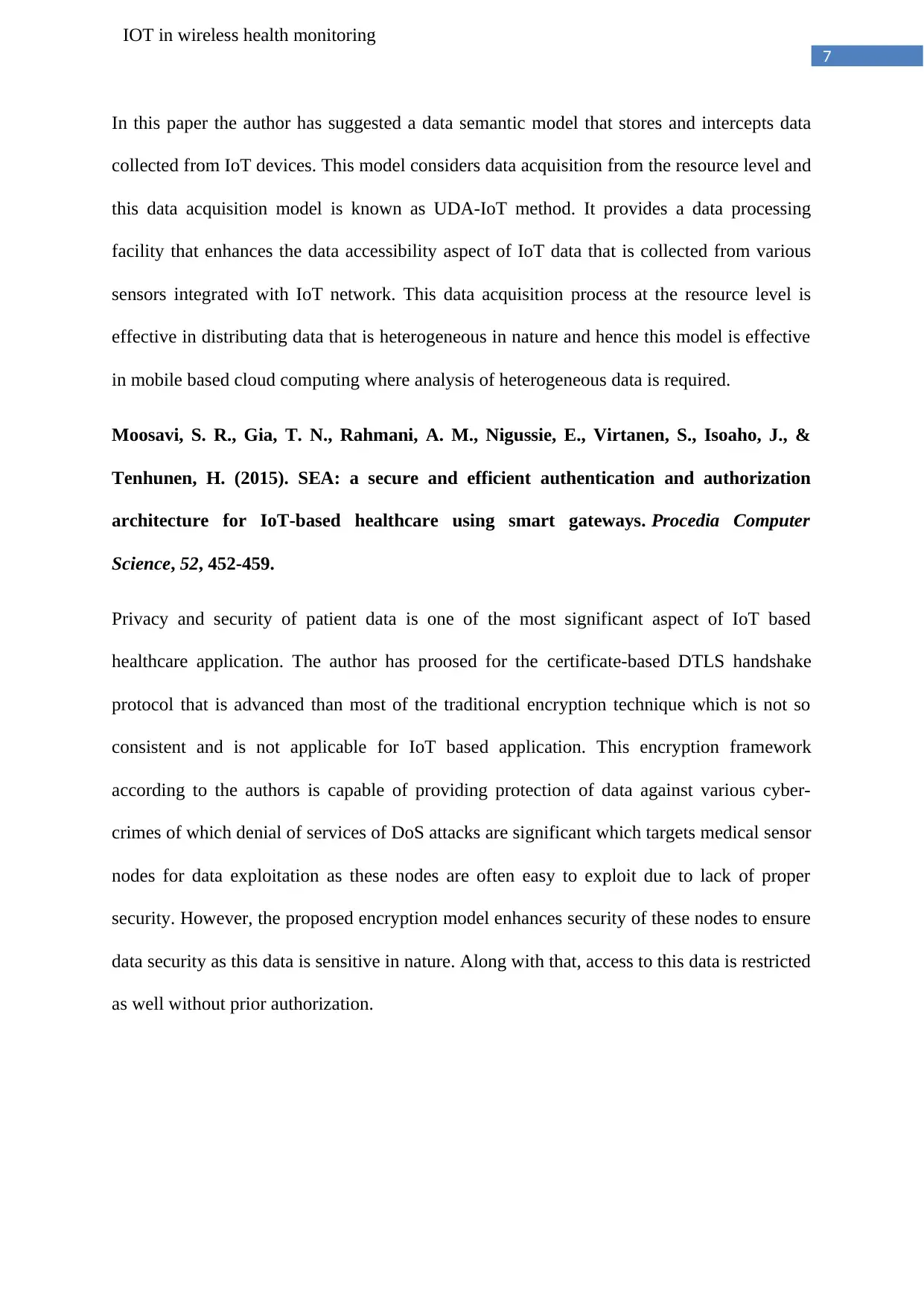
7
IOT in wireless health monitoring
In this paper the author has suggested a data semantic model that stores and intercepts data
collected from IoT devices. This model considers data acquisition from the resource level and
this data acquisition model is known as UDA-IoT method. It provides a data processing
facility that enhances the data accessibility aspect of IoT data that is collected from various
sensors integrated with IoT network. This data acquisition process at the resource level is
effective in distributing data that is heterogeneous in nature and hence this model is effective
in mobile based cloud computing where analysis of heterogeneous data is required.
Moosavi, S. R., Gia, T. N., Rahmani, A. M., Nigussie, E., Virtanen, S., Isoaho, J., &
Tenhunen, H. (2015). SEA: a secure and efficient authentication and authorization
architecture for IoT-based healthcare using smart gateways. Procedia Computer
Science, 52, 452-459.
Privacy and security of patient data is one of the most significant aspect of IoT based
healthcare application. The author has proosed for the certificate-based DTLS handshake
protocol that is advanced than most of the traditional encryption technique which is not so
consistent and is not applicable for IoT based application. This encryption framework
according to the authors is capable of providing protection of data against various cyber-
crimes of which denial of services of DoS attacks are significant which targets medical sensor
nodes for data exploitation as these nodes are often easy to exploit due to lack of proper
security. However, the proposed encryption model enhances security of these nodes to ensure
data security as this data is sensitive in nature. Along with that, access to this data is restricted
as well without prior authorization.
IOT in wireless health monitoring
In this paper the author has suggested a data semantic model that stores and intercepts data
collected from IoT devices. This model considers data acquisition from the resource level and
this data acquisition model is known as UDA-IoT method. It provides a data processing
facility that enhances the data accessibility aspect of IoT data that is collected from various
sensors integrated with IoT network. This data acquisition process at the resource level is
effective in distributing data that is heterogeneous in nature and hence this model is effective
in mobile based cloud computing where analysis of heterogeneous data is required.
Moosavi, S. R., Gia, T. N., Rahmani, A. M., Nigussie, E., Virtanen, S., Isoaho, J., &
Tenhunen, H. (2015). SEA: a secure and efficient authentication and authorization
architecture for IoT-based healthcare using smart gateways. Procedia Computer
Science, 52, 452-459.
Privacy and security of patient data is one of the most significant aspect of IoT based
healthcare application. The author has proosed for the certificate-based DTLS handshake
protocol that is advanced than most of the traditional encryption technique which is not so
consistent and is not applicable for IoT based application. This encryption framework
according to the authors is capable of providing protection of data against various cyber-
crimes of which denial of services of DoS attacks are significant which targets medical sensor
nodes for data exploitation as these nodes are often easy to exploit due to lack of proper
security. However, the proposed encryption model enhances security of these nodes to ensure
data security as this data is sensitive in nature. Along with that, access to this data is restricted
as well without prior authorization.
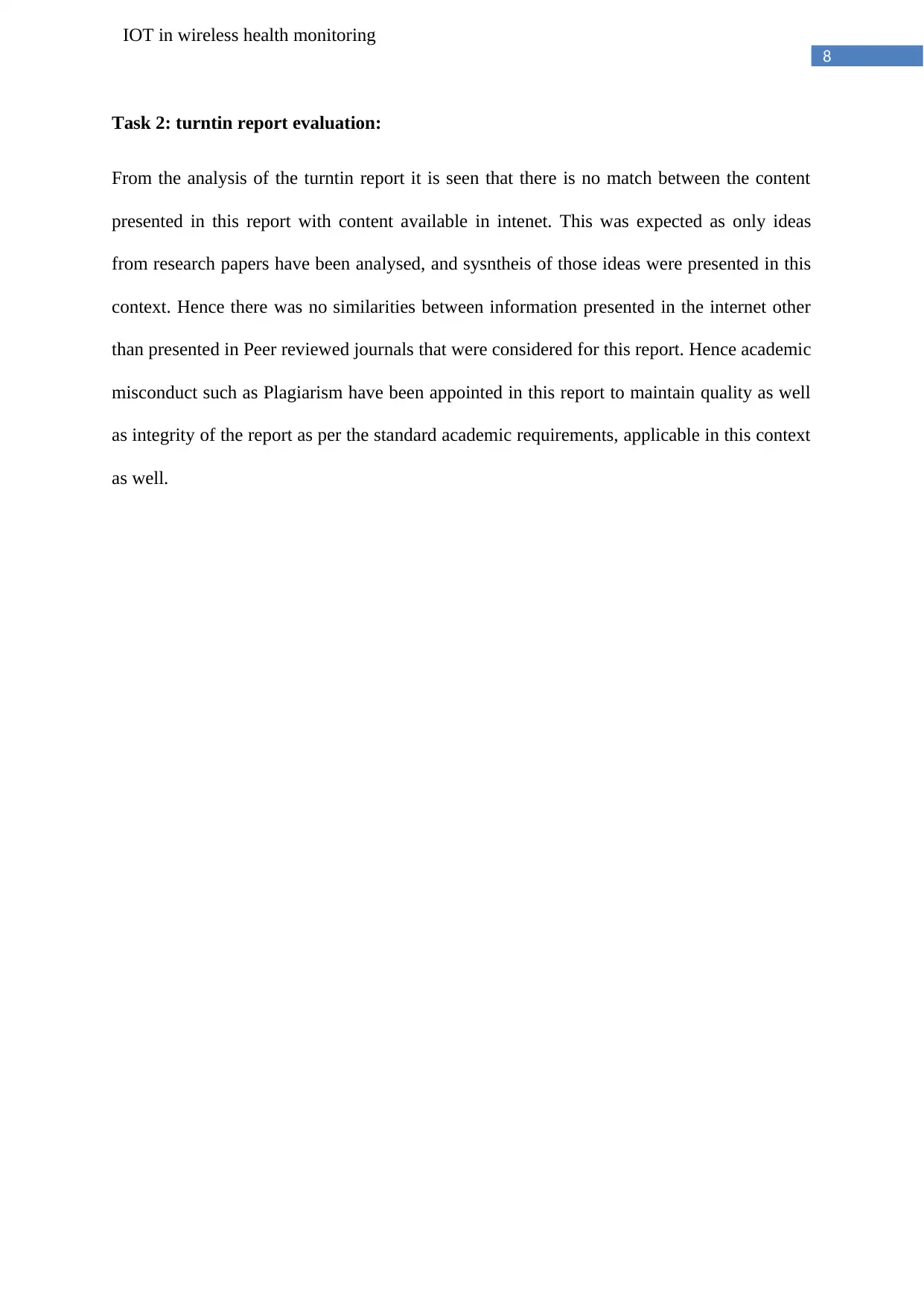
8
IOT in wireless health monitoring
Task 2: turntin report evaluation:
From the analysis of the turntin report it is seen that there is no match between the content
presented in this report with content available in intenet. This was expected as only ideas
from research papers have been analysed, and sysntheis of those ideas were presented in this
context. Hence there was no similarities between information presented in the internet other
than presented in Peer reviewed journals that were considered for this report. Hence academic
misconduct such as Plagiarism have been appointed in this report to maintain quality as well
as integrity of the report as per the standard academic requirements, applicable in this context
as well.
IOT in wireless health monitoring
Task 2: turntin report evaluation:
From the analysis of the turntin report it is seen that there is no match between the content
presented in this report with content available in intenet. This was expected as only ideas
from research papers have been analysed, and sysntheis of those ideas were presented in this
context. Hence there was no similarities between information presented in the internet other
than presented in Peer reviewed journals that were considered for this report. Hence academic
misconduct such as Plagiarism have been appointed in this report to maintain quality as well
as integrity of the report as per the standard academic requirements, applicable in this context
as well.
⊘ This is a preview!⊘
Do you want full access?
Subscribe today to unlock all pages.

Trusted by 1+ million students worldwide
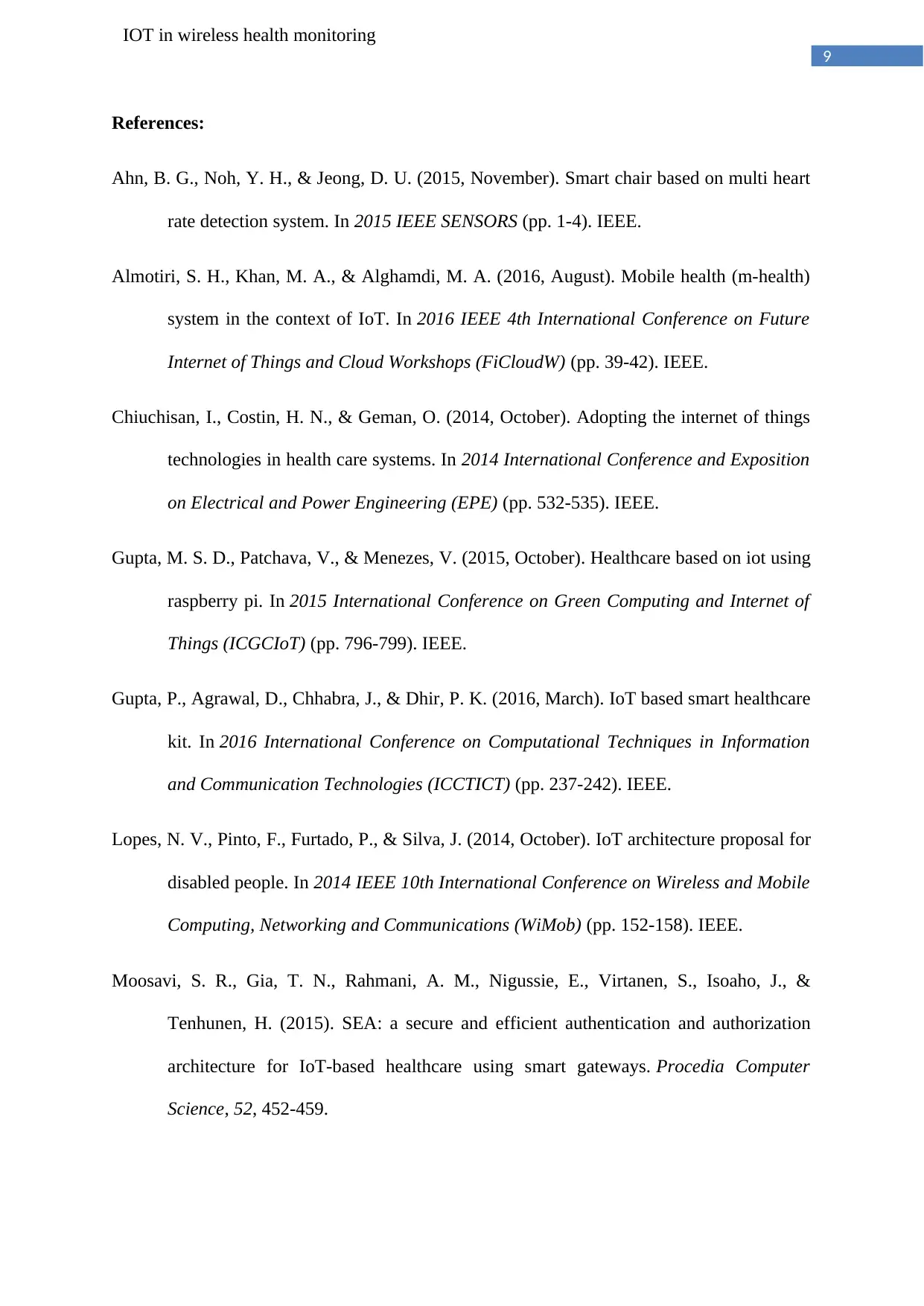
9
IOT in wireless health monitoring
References:
Ahn, B. G., Noh, Y. H., & Jeong, D. U. (2015, November). Smart chair based on multi heart
rate detection system. In 2015 IEEE SENSORS (pp. 1-4). IEEE.
Almotiri, S. H., Khan, M. A., & Alghamdi, M. A. (2016, August). Mobile health (m-health)
system in the context of IoT. In 2016 IEEE 4th International Conference on Future
Internet of Things and Cloud Workshops (FiCloudW) (pp. 39-42). IEEE.
Chiuchisan, I., Costin, H. N., & Geman, O. (2014, October). Adopting the internet of things
technologies in health care systems. In 2014 International Conference and Exposition
on Electrical and Power Engineering (EPE) (pp. 532-535). IEEE.
Gupta, M. S. D., Patchava, V., & Menezes, V. (2015, October). Healthcare based on iot using
raspberry pi. In 2015 International Conference on Green Computing and Internet of
Things (ICGCIoT) (pp. 796-799). IEEE.
Gupta, P., Agrawal, D., Chhabra, J., & Dhir, P. K. (2016, March). IoT based smart healthcare
kit. In 2016 International Conference on Computational Techniques in Information
and Communication Technologies (ICCTICT) (pp. 237-242). IEEE.
Lopes, N. V., Pinto, F., Furtado, P., & Silva, J. (2014, October). IoT architecture proposal for
disabled people. In 2014 IEEE 10th International Conference on Wireless and Mobile
Computing, Networking and Communications (WiMob) (pp. 152-158). IEEE.
Moosavi, S. R., Gia, T. N., Rahmani, A. M., Nigussie, E., Virtanen, S., Isoaho, J., &
Tenhunen, H. (2015). SEA: a secure and efficient authentication and authorization
architecture for IoT-based healthcare using smart gateways. Procedia Computer
Science, 52, 452-459.
IOT in wireless health monitoring
References:
Ahn, B. G., Noh, Y. H., & Jeong, D. U. (2015, November). Smart chair based on multi heart
rate detection system. In 2015 IEEE SENSORS (pp. 1-4). IEEE.
Almotiri, S. H., Khan, M. A., & Alghamdi, M. A. (2016, August). Mobile health (m-health)
system in the context of IoT. In 2016 IEEE 4th International Conference on Future
Internet of Things and Cloud Workshops (FiCloudW) (pp. 39-42). IEEE.
Chiuchisan, I., Costin, H. N., & Geman, O. (2014, October). Adopting the internet of things
technologies in health care systems. In 2014 International Conference and Exposition
on Electrical and Power Engineering (EPE) (pp. 532-535). IEEE.
Gupta, M. S. D., Patchava, V., & Menezes, V. (2015, October). Healthcare based on iot using
raspberry pi. In 2015 International Conference on Green Computing and Internet of
Things (ICGCIoT) (pp. 796-799). IEEE.
Gupta, P., Agrawal, D., Chhabra, J., & Dhir, P. K. (2016, March). IoT based smart healthcare
kit. In 2016 International Conference on Computational Techniques in Information
and Communication Technologies (ICCTICT) (pp. 237-242). IEEE.
Lopes, N. V., Pinto, F., Furtado, P., & Silva, J. (2014, October). IoT architecture proposal for
disabled people. In 2014 IEEE 10th International Conference on Wireless and Mobile
Computing, Networking and Communications (WiMob) (pp. 152-158). IEEE.
Moosavi, S. R., Gia, T. N., Rahmani, A. M., Nigussie, E., Virtanen, S., Isoaho, J., &
Tenhunen, H. (2015). SEA: a secure and efficient authentication and authorization
architecture for IoT-based healthcare using smart gateways. Procedia Computer
Science, 52, 452-459.
Paraphrase This Document
Need a fresh take? Get an instant paraphrase of this document with our AI Paraphraser
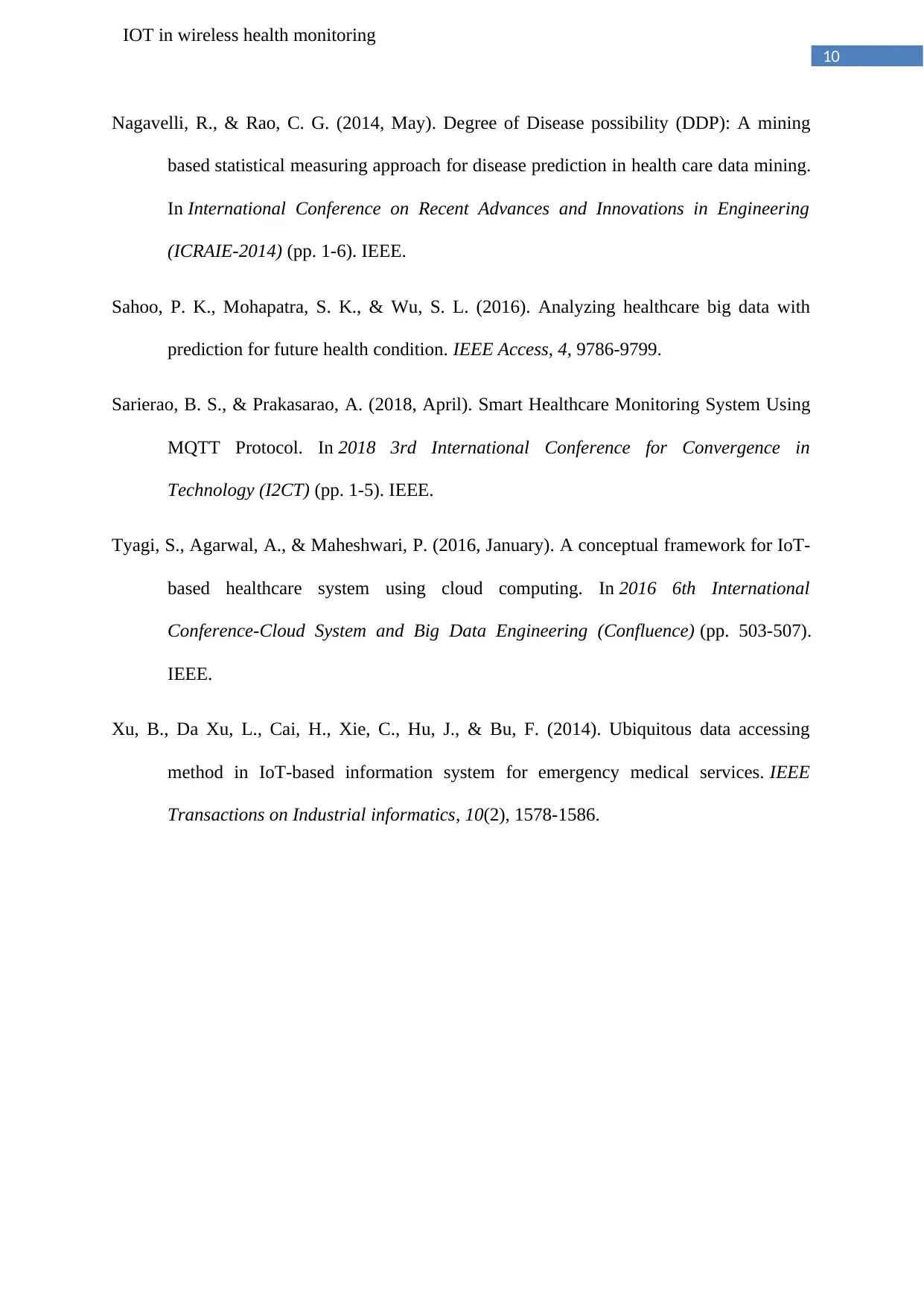
10
IOT in wireless health monitoring
Nagavelli, R., & Rao, C. G. (2014, May). Degree of Disease possibility (DDP): A mining
based statistical measuring approach for disease prediction in health care data mining.
In International Conference on Recent Advances and Innovations in Engineering
(ICRAIE-2014) (pp. 1-6). IEEE.
Sahoo, P. K., Mohapatra, S. K., & Wu, S. L. (2016). Analyzing healthcare big data with
prediction for future health condition. IEEE Access, 4, 9786-9799.
Sarierao, B. S., & Prakasarao, A. (2018, April). Smart Healthcare Monitoring System Using
MQTT Protocol. In 2018 3rd International Conference for Convergence in
Technology (I2CT) (pp. 1-5). IEEE.
Tyagi, S., Agarwal, A., & Maheshwari, P. (2016, January). A conceptual framework for IoT-
based healthcare system using cloud computing. In 2016 6th International
Conference-Cloud System and Big Data Engineering (Confluence) (pp. 503-507).
IEEE.
Xu, B., Da Xu, L., Cai, H., Xie, C., Hu, J., & Bu, F. (2014). Ubiquitous data accessing
method in IoT-based information system for emergency medical services. IEEE
Transactions on Industrial informatics, 10(2), 1578-1586.
IOT in wireless health monitoring
Nagavelli, R., & Rao, C. G. (2014, May). Degree of Disease possibility (DDP): A mining
based statistical measuring approach for disease prediction in health care data mining.
In International Conference on Recent Advances and Innovations in Engineering
(ICRAIE-2014) (pp. 1-6). IEEE.
Sahoo, P. K., Mohapatra, S. K., & Wu, S. L. (2016). Analyzing healthcare big data with
prediction for future health condition. IEEE Access, 4, 9786-9799.
Sarierao, B. S., & Prakasarao, A. (2018, April). Smart Healthcare Monitoring System Using
MQTT Protocol. In 2018 3rd International Conference for Convergence in
Technology (I2CT) (pp. 1-5). IEEE.
Tyagi, S., Agarwal, A., & Maheshwari, P. (2016, January). A conceptual framework for IoT-
based healthcare system using cloud computing. In 2016 6th International
Conference-Cloud System and Big Data Engineering (Confluence) (pp. 503-507).
IEEE.
Xu, B., Da Xu, L., Cai, H., Xie, C., Hu, J., & Bu, F. (2014). Ubiquitous data accessing
method in IoT-based information system for emergency medical services. IEEE
Transactions on Industrial informatics, 10(2), 1578-1586.
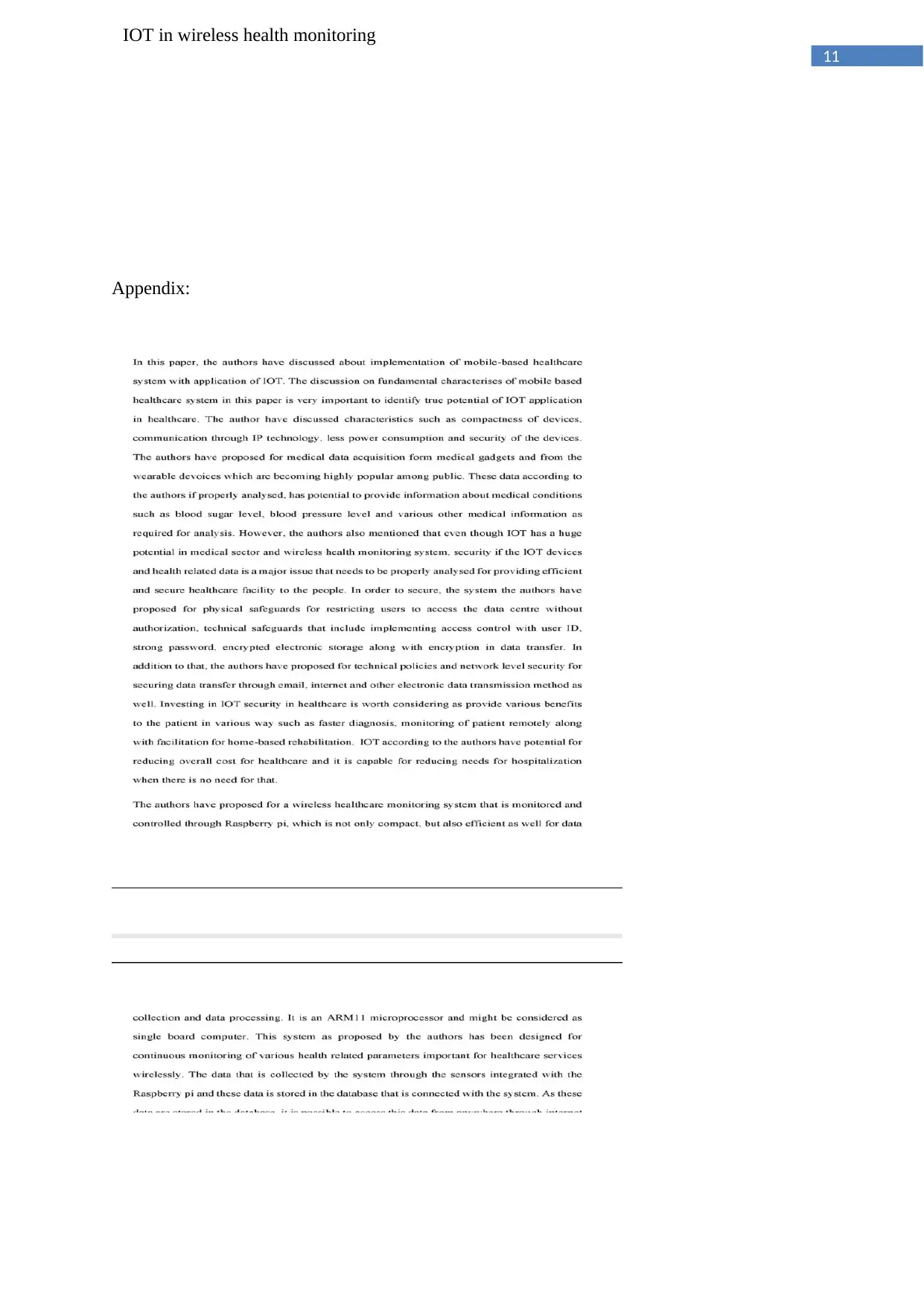
11
IOT in wireless health monitoring
Appendix:
IOT in wireless health monitoring
Appendix:
⊘ This is a preview!⊘
Do you want full access?
Subscribe today to unlock all pages.

Trusted by 1+ million students worldwide
1 out of 14
Related Documents
Your All-in-One AI-Powered Toolkit for Academic Success.
+13062052269
info@desklib.com
Available 24*7 on WhatsApp / Email
![[object Object]](/_next/static/media/star-bottom.7253800d.svg)
Unlock your academic potential
Copyright © 2020–2026 A2Z Services. All Rights Reserved. Developed and managed by ZUCOL.





